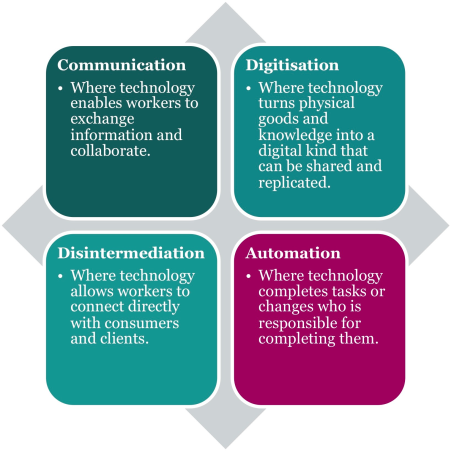Technology impact on work
In this roundtable Benedict Dellot, Head of the RSA Future Work Centre, described ‘Four Forces of Technology’, as a way to help think about technology strategy:
- Automation
- Communication
- Digitisation
- Disintermediation (cutting out the ‘middle men’)
Each of these forces has a different potential impact on the quality and quantity of jobs. Participants discussed their technology priorities and likely impacts on the workforce.
Roundtable summary
The roundtable brought together individuals from diverse industries and countries to explore how technologies are impacting employees and the workplace.
Part 1: Insight
Participants shared details of their firms’ priority technology projects for 2019:
- Creation of employee portals (1-stop shops) to help navigate existing software, and to support employee up/reskilling.
- Technology solutions that make learning new (digital) skills or concepts (blockchain) simple and mobile. Solutions that meet diverse learning needs of employees.
- Technology to automate aspects of client/customer service.
- People and analytics solutions that give managers better access to workforce planning / recruitment related data.
- Solutions such as VideoMyJob that make the recruitment processes more innovative
- Solutions that integrate/automate business processes and services (e.g. Workday, SuccessFactors). HCM/ERP solutions such as Oracle Fusion.
- Applications that support collaboration between teams and/or with clients (e.g. Workplace by Facebook, Office 365)
Part 2: Innovation
Today’s ‘provocateur’, Benedict Dellot, explained how his team at RSA are trying to deepen the debate around the impact of new technologies on jobs, which has been focused on the negative impact of certain technologies (e.g. automation using AI). Benedict presented RSA’s view of the Four Forces of Technology driving changes to both the quantity and quality of jobs (see graphic below).

He suggested that the impact of automation is much more than substituting humans for machines, and should be thought of in terms of four categories – Augmentation, Generation, Transference and Substitution.
Benedict concluded by explaining his team’s aims – to equip policy and decision makers with the insights required to better prepare workers for the future. RSA is achieving this through scenario planning that considers multiple futures and potential impacts.
Part 3: Impact
Attendees shared insights from their own experiences. Themes included:
- The challenge of deploying new tech in ways that benefit organisations and employees (and limits employee change fatigue)
- Examples of organisations engaging employees in bold/innovative ways – example given of Aviva offering employees re-skilling if they voluntarily identified their jobs as suitable for automation.
- Ethical dilemmas associated with the use of technologies (biased AI, sophisticated psychometric testing, smart marketing algorithms) and how HR can support business leaders with these challenges.
- Country/organisation differences in culture and rates of adoption of new technology
- Digital solutions (apps) supporting re-skilling, including an app to assess digital readiness.
- Finding the balance between letting teams use differing tech vs. standardising tech solutions across a global workplace.
This event has passed
Thank you to everyone who took part in this event. If you're interested in getting involved check if we have any future events planned.



